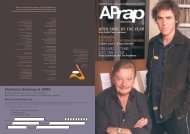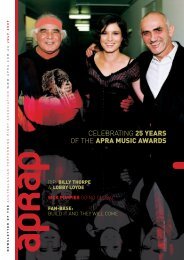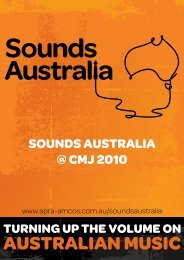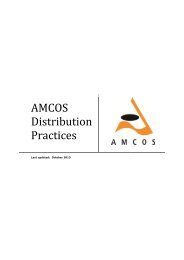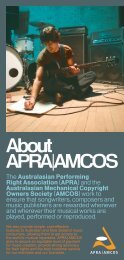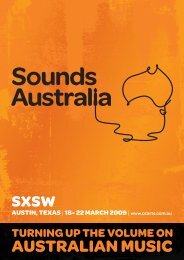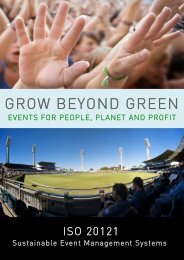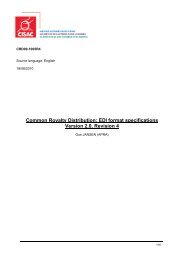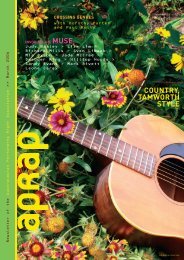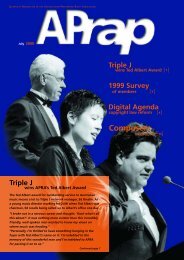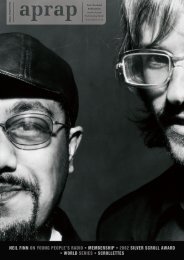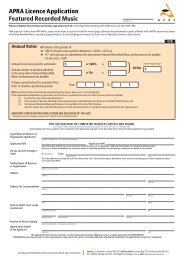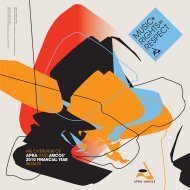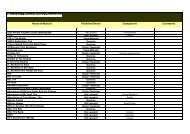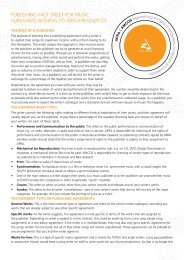CLARE BOWDITCH - APRA
CLARE BOWDITCH - APRA
CLARE BOWDITCH - APRA
Create successful ePaper yourself
Turn your PDF publications into a flip-book with our unique Google optimized e-Paper software.
PDAPOSTCARDS<br />
Our 2006 Professional Development Award<br />
winners report on how their <strong>APRA</strong> PDA grant<br />
has helped them achieve their music career<br />
ambitions. This issue features postcards from<br />
popular contemporary winner, Amira Pyliotis<br />
and classical winner Natalie Williams.<br />
>> Natalie Williams<br />
>> Amira Pyliotis<br />
Amira Pyliotis (Tecoma)<br />
Popular Contemporary<br />
Music<br />
Last New Years I decided<br />
this was going to be the<br />
year I’d finally record<br />
my debut album. After a full<br />
year of performing in 2005,<br />
when 2006 rolled around I<br />
was hungry for just enough<br />
silence and space to dream<br />
up the most beautiful record<br />
imaginable. I’d put in place a<br />
plan and a rough timeline and<br />
managed to secure the financial<br />
support of a mustering friend<br />
from Alice Springs; so the<br />
most important aspects of the<br />
record would be captured in a<br />
warm studio environment. But<br />
I was torn between moving<br />
to Melbourne, with its easy<br />
access to great musicians,<br />
my old music teachers, techheads<br />
and great recording<br />
facilities- and staying in Alice<br />
Springs where I’d been living<br />
and writing, to try and better<br />
capture the colours my songs<br />
had been conceived in.<br />
And then I won an <strong>APRA</strong> PDA.<br />
After getting over my initial<br />
disbelief and momentary<br />
hysteria (!!) my plans for the<br />
year quickly went out the<br />
window. The performance<br />
invitations that were part of<br />
being a PDA recipient (including<br />
a live TV performance in<br />
March, followed by the <strong>APRA</strong><br />
awards in July) introduced me<br />
to musicians and songwriters<br />
I would never have met<br />
otherwise. Many of these<br />
people have ended up shaping<br />
aspects of my debut album<br />
in ways I might never have<br />
previously imagined.<br />
Winning the PDA also enabled<br />
me to buy sound equipment to<br />
experiment with arrangements<br />
and production of songs I’m<br />
working on, regardless of<br />
whether I’m on the road or at<br />
home. As well as giving me<br />
creative freedom I wouldn’t<br />
otherwise have had, it’s given<br />
me the capacity to record some<br />
of the most talented musicians<br />
I’ve had the good fortune to<br />
cross paths with over the past<br />
two years spent travelling and<br />
playing around Australia.<br />
By the time my debut album<br />
Home Brew is mastered, it will<br />
include performances from<br />
musicians captured in Alice<br />
Springs, Darwin, Sydney,<br />
Melbourne and a couple of<br />
places in between. But rather<br />
than the end result sounding<br />
like a musical modern day<br />
Prometheus, it’s sounding bit<br />
by bit like my dream line-up of<br />
musician friends have all been<br />
brought together and managed<br />
to make music.<br />
Next year after I release Home<br />
Brew, side projects include<br />
completing work on my<br />
contribution to a Gotye re-mix<br />
record, as well as spending<br />
time exploring the first of<br />
hopefully what will be many<br />
co-writing collaborations I<br />
began on a recent PDA-funded<br />
trip to the US.<br />
In a more subtle way, winning<br />
the <strong>APRA</strong> PDA has changed<br />
the way I regard myself as a<br />
musician and songwriter. I’ve<br />
begun to see myself as very<br />
much a part of the wider<br />
sphere that is the Australian<br />
music-making community, as<br />
opposed to a musician writing<br />
songs in isolation at the<br />
periphery of it. Collaborations<br />
seem a lot more possible; a lot<br />
less scary than they have in<br />
the past and seem to present<br />
an opportunity to continue<br />
learning about music outside<br />
of the classroom. While it<br />
doesn’t seem that the new<br />
challenges on the horizon<br />
ever stop coming, being a<br />
recipient of the <strong>APRA</strong> PDA has<br />
much better equipped me with<br />
resources to draw on in this<br />
life-long ambition of making<br />
music. Thanks <strong>APRA</strong>!<br />
Natalie Williams<br />
Classical Music<br />
In February 2006 I received<br />
two opportunities that<br />
have immeasurably changed<br />
my career as a composer. I<br />
was accepted as a graduate<br />
student into the Jacobs School<br />
of Music at the University of<br />
Indiana, and was also awarded<br />
the 2006 Classical Music<br />
category <strong>APRA</strong> Professional<br />
Development Award.<br />
Since August this year I have<br />
been studying for a Doctoral<br />
degree in Composition here<br />
at Indiana University (IU).<br />
The Music School boasts a<br />
student body of over 1,500<br />
which means lots of available<br />
performers for premiering new<br />
works. The school gives over<br />
1,000 concert performances<br />
each year, presents four opera<br />
seasons, three ballet seasons<br />
and concerts and recitals by<br />
one if its five full-time student<br />
orchestras.<br />
Our compositional activity<br />
is centred around a busy<br />
schedule of recitals at which<br />
each composition student is<br />
required to present new works<br />
written while at IU. One of my<br />
solo flute pieces Haiku, written<br />
while I was an undergraduate<br />
in Adelaide, was performed at<br />
an IU recital in October – my<br />
first overseas performance.<br />
The composition faculty are<br />
incredibly supportive and<br />
inspiring and I’m currently<br />
working with Professors<br />
Claude Baker and David<br />
Ward-Steinman.<br />
Opportunities for collaboration<br />
and new creative work are<br />
endless. The composition<br />
school is working in partnership<br />
this semester with the IU<br />
School of Dance in a project<br />
titled: Hammer and Nail,<br />
where composers are paired<br />
with student choreographers<br />
to jointly create and design<br />
new works for dance and live<br />
instrumental performance.<br />
IU has a resident New Music<br />
Ensemble which is devoted to<br />
the performance and premiere<br />
of new works written largely<br />
after 1950. In early December<br />
they will conduct ‘reading’<br />
sessions with selected IU<br />
composers, which is a great<br />
way to get to know the student<br />
performers and hear our music<br />
workshopped in a high-level<br />
performance setting.<br />
Each semester up to four<br />
visiting composers of<br />
international stature are<br />
invited to IU to present their<br />
works and give masterclasstype<br />
composition lessons to<br />
students. In October I had the<br />
chance to work with Lansing<br />
McKloskey and in November<br />
I studied with Bernard Rands,<br />
a Pulitzer Prize winning<br />
composer, currently based in<br />
Chicago.<br />
Upcoming events which we<br />
will be participating in as IU<br />
students include, the Mid-<br />
West Composers Symposium<br />
in early 2007, the IU String<br />
Quartet competition and<br />
the ‘Music for Kids’ project.<br />
The latter involves working<br />
with music students from<br />
a local primary school and<br />
orchestrating some of their<br />
own melodies for symphonic<br />
or wind band ensembles, to be<br />
later premiered on campus.<br />
I’m currently working on two<br />
orchestral pieces; one for the<br />
Adelaide Symphony Orchestra<br />
early next year and one for<br />
the Advanced Orchestration<br />
class. I’m also writing some<br />
smaller instrumental works for<br />
trombone solo and a chamber<br />
piece for the IU Recorder<br />
Ensemble. Amongst an existing<br />
schedule of graduate theory<br />
and musicology classes, this<br />
certainly keeps me busy.<br />
In early November I was<br />
invited to present a seminar,<br />
for the Graduate Composition<br />
Masterclass, on Australian<br />
Contemporary Classical Music<br />
which was an excellent way to<br />
introduce my IU colleagues to<br />
the rich heritage of Australian<br />
composition and speak about<br />
recent trends and emerging<br />
voices down under. The<br />
atmosphere amongst the<br />
faculty is extremely collegiate<br />
and supportive and the staff<br />
and students have welcomed<br />
me as ‘the’ Australian graduate<br />
student for 2006.<br />
The support of the <strong>APRA</strong> PDA<br />
award has made possible for<br />
me this study and relocation<br />
to North America. Without<br />
this financial support to<br />
cover flights, university fees,<br />
textbooks and registration<br />
costs, it simply wouldn’t be<br />
possible for me to have made<br />
this move. This invaluable<br />
aid has opened up so many<br />
new doors and will enable<br />
me to train at the highest<br />
international level, eventually<br />
bringing these skills back to<br />
Australia.<br />
Thankyou <strong>APRA</strong> for making<br />
this possible and supporting<br />
my work at this international<br />
level.<br />
A P R A P D E C E M B E R 2 0 0 6 > > 0 4



